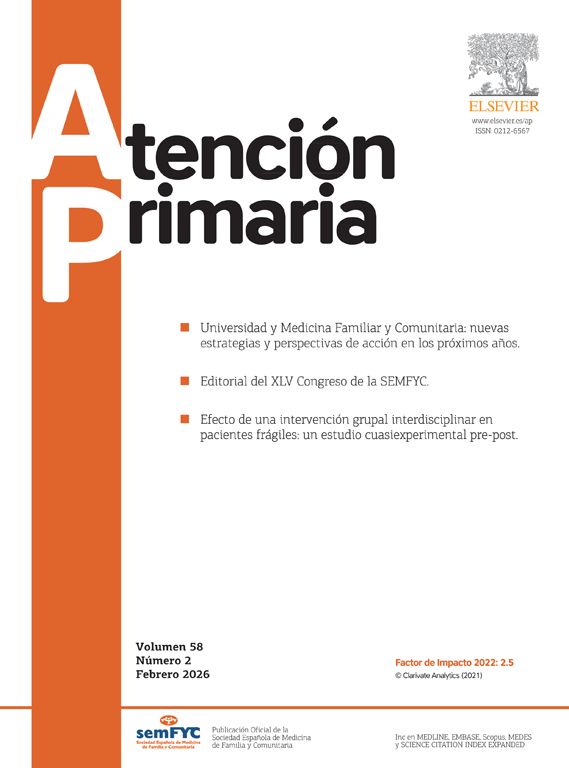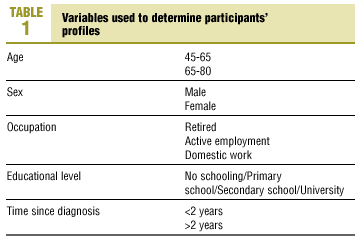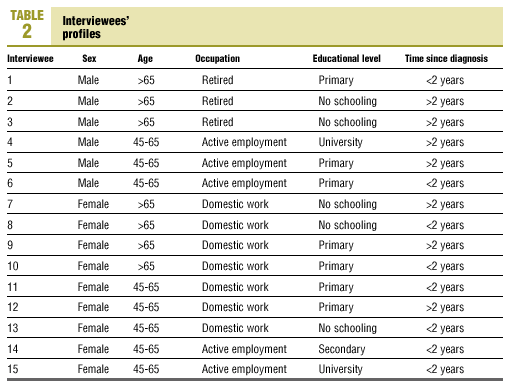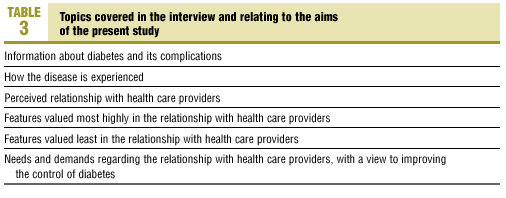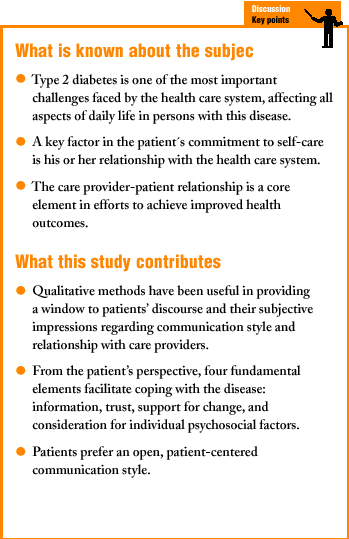Introduction
Type 2 diabetes is one of most important challenges health care systems face. Not only is this disease associated with a high rate of service use owing to its short-term and long-term complications, but moreover, its impact on patients is considerable.1 Diabetes affects different aspects of their daily life and personal, family, social and occupational relationships, as well as their functional capacity and quality of life. The care measures and changes these persons need to implement to control their disease are directly dependent on their degree of commitment to and acceptance of responsibility for self-care. And a key factor in their commitment to self-care is their relationship with the health system.2
To improve interventions for processes of health and illness, patients with a chronic illness should be active protagonists in their own care.3,4 Accordingly, the time has now arrived, it seems, to examine the so-called patient-centered systems, an approach with the potential to change the way health care is organized.5 The provider-patient relationship is a core element in this model of care.6 When patients perceive that their perspective, experiences and decisions related with the disease are taken into account, they participate in and cooperate with the treatment plan more actively and effectively. This, in the long run, improves the outcomes.7
When patients and care providers negotiate to develop alternatives and reach decisions together, both their own satisfaction and the clinical outcomes are improved.8,9 Nevertheless, few studies have analyzed the subjective perceptions and experiences of patients with type 2 diabetes with regard to their illness.10 The aim of this study was to identify and comprehend the perceptions and experiences of persons with diabetes, and to shed light on their view of the relationship with primary health care providers (physicians and nurses).
Participants and methods
Because of the nature of the aims of this study, we opted to use qualitative methods as our purpose was to comprehend the subjective point of view of the study population.11-13 The technique used to generate data was the open interview.14 This technique involves a face-to-face meeting between investigators and informants aimed at understanding the informants' perspective on their lives, experiences or practices, as expressed in their own words.15
The field work was done during the period from September to December, 2000. We interviewed 15 persons who had type 2 diabetes, identified from the list of persons served by the Barrio del Pilar health center located in health care area 5 in the city of Madrid (Spain). The variables used to design the profiles of persons to be interviewed (structured sample) are shown in Table 1; these variables were chosen to ensure a degree of heterogeneity in the group of informants. The actual profiles of the interviewees are summarized in Table 2. The topic guide used for the interviews, as referred to the aims of the present study, is shown in Table 3.
Mean duration of the interviews was 60 min, and all interviews took place on the premises of the Instituto de Salud Carlos III in Madrid. The interviews were tape-recorded with the consent of the interviewees, and the tapes were transcribed to obtain a text of the speakers' discourse. These texts were analyzed and interpreted as reported below. The resulting information was analyzed and interpreted by the investigator/interviewer. First the texts were read several times to underline specific content and make note of the possible significance of the discourse for the speaker. Then phrases and sentences that best reflected the speakers' opinions in relation to the aims of the present study were selected and grouped according to subject to identify topics and categories that were informative. These categories were then structured, on the basis of our understanding and analysis of the meanings and significance of discourse elements, into topics that were informative of the patient's perspective.
Results
Perception of and experiences with diabetes
Once the diagnosis of diabetes is established by health care providers, an individual's assessment of his or her illness depends on a variety of considerations such as the presence or absence of symptoms, the need to use insulin, and information and beliefs about the disease. In general, diabetes is not perceived as a serious disease--a fact apparently related with the absence of symptoms. As a result the participants sustain the idea of living for the present for as long as possible before symptoms appear, and the moment presumably arrives when they become more intensely committed.
«I do consider myself a diabetic, but I don't practice. It's not a set of rules I follow very strictly, because that's just how it is.»
«I really don't feel any pain and the truth is that when the lab values have been high, I can't say that I noticed anything strange--I don't know, I mean, I feel like I'm in good health.»
Some patients express feelings of frustration and rejection triggered by the diagnosis, by the poor results or by the limitations diabetes imposes and the things that it requires a person to give up. These feelings also arise from the stress and guilt associated with difficulties with or resistance to change. In their discourse, these emotions are related with worse coping and weaker adherence.
«Health matters to me, and besides, I get frightened easily, really easily. But then I neglect what I'm supposed to do.»
Information about diabetes and its complications
Most of the persons we interviewed reported receiving little information about the progression of their disease and its possible complications. Some patients reported that concern over their diabetes appeared or increased when complications appeared that altered significant aspects of their life.
«What most worries me now is sex, because if I can only do it once a month, and badly...what good is that?»
Once the interviewee has internalized and become conscious of the possibility of complications that might affect the quality of life he or she currently enjoys and hopes to maintain in the future, the patient is more likely to accept appropriate self-care measures.
«Not being able to move is the only thing that might worry me, and needing help from other persons. As long as I can put up with the illness now, if I can bear it, I prefer to go without eating things or doing things I shouldn't so that the results later on will be better.»
We noted strong fear and rejection of the eventuality of needing insulin treatment. This was perceived as the final and most serious stage in the disease process.
«That's dreadful, having to use insulin and stuff like that, that's dreadful.»
Keys to care provider-patient communication
The participants repeatedly expressed the need to be listened to, for empathy, respect and warmth from health care providers--needs that were associated, in the users' opinion, with satisfaction with the health system. Patients admitted that when communication was not good, they felt uneasy and more vulnerable. These feelings can be considered sufficient motive for neglecting adherence to treatment, for breaking off relations with the care provider, or, in some cases, for breaking off relations with the health system.
«I value the way we are treated very highly because if you go to a doctor who's an unfeeling hangman, you're very discouraged when you leave. If the doctor is pleasant and all that, I value this very highly.»
«If they treat me badly, I won't go back, I just won't. I tell them so, and it's over and that's that.»
The role of information
The interviews documented the importance, for coping with the disease, of the moment when the diagnosis is made, the type of information provided, and the manner in which it is communicated. According to patients' perceptions, care givers sometimes provide vague, unspecific information, and avoid dealing openly with the problem and the patients' reactions.
«Maybe they aren't able to deal with persons--and I know there are a lot--like me. I remember that when they discovered it they didn't tell me the truth. I don't know if they did me a favor or not; all they told me was that I needed to sort of gradually change my way of living.»
Participants expressed interest in gaining access to information that would allow them to understand different features of the disease. They also expressed the desire to be informed of their actual health status and to understand the reasons, effects and possible results of certain therapies or recommendations. This need for information was not always perceived to be understood or satisfied by health services.
«They should inform you a bit more truthfully about your...I know that they've got a lot better, but if they talk to you a little, you're informed. Some doctors do inform you, but there are others that don't: "you're to take this", and that's it.»
Trust
Trust was valued as the core of the care giver-patient relationship. This variable comprised elements that went beyond the care giver's technical expertise, and that were related with the care-giver's ability to create an atmosphere of understanding and acceptance.
«I think the patient's trust in the doctor is fundamental; the trust the doctor inspires in you, even though he or she may not be the best technically speaking.»
Shared decision-making
Informants, especially younger participants with higher levels of education, demanded active participation and being allowed to play the main role in decision-making about their disease and treatment. They wanted the action plan for diabetes management to be coherent and realistic in view of their personal situation, life circumstances, and abilities.
«If I understand myself, I'll take control, and if I don't understand myself I'll put on blinkers and let somebody else control me. How long is this going to go on? Until the day I say "That's it'.»
Some interviewees expressed the need to find a balance between the limitations imposed by their disease and their desires. In this connection they emphasized that if control was too strict, it could be counterproductive in terms of maintaining their motivation.
«I think it's about striking the right balance between doing what you ought to do and what you feel like doing. There's a half-way point where I try to place myself.»
Participants expressed the need for the care provider-patient relationship to be based on a therapeutic alliance--a pact of collaboration between the two parties.
«That's what I think, that the doctor and the patient have to work together arm in arm, so to speak.»
For some participants the care giver represents the role of authority who penalizes behaviors by patients who disobey his or her instructions. When faced with this attitude patients feel that they are being blamed for the situation, a feeling that can lead them to lie and not admit to having difficulties caring for their diabetes.
«It's the way I am. I have to see the doctor, maybe I don't tell her the truth, understand? Because on top of it I know she's going to chew me out.»
The perception by some patients that they have been labeled as a noncomplier by the care giver gives rise to reactions of inhibition. This attitude then becomes an obstacle to asking questions and expressing doubt or disagreement.
«Since I don't do what the doctor says, he can say "Hey, what are you playing at? Why on earth are you asking me that?!"»
«The doctor must think I'm a lost cause.»
Help and support needs
Some patients demand help and support from health care providers to manage problems associated with the control of their diabetes. Participants complained about the unease caused by interactions in which the care giver simply asked questions and repeated the same advice. Some interviewees felt that medical interventions based on one-way communication was inappropriate if the patient's point of view and needs were not considered.
«Always the same questions, always the same thing, how much do you weigh?, how much do you smoke?, do you ever drink whisky? watch your diet, don't eat this or that...That's all well and good, but there's a type of patient who needs, I don't know...you want some sort of help.»
«But now in my scene, this solution in this scene, which is my life...We know the theory all right, but now how do I put it into practice?»
Discussion
As in other studies that used a qualitative approach to investigate chronic disease,16 this methodology was useful in opening up a window on the discourse and perspectives of persons with diabetes with regard to their illness. It also shed light on their views and opinions with regard to primary health care providers. Understanding the patient's existential framework and how he or she experiences the disease is crucial to developing strategies for intervention and improvement.17
One limitation of this study is that we cannot generalize the results to the general population, as our participants were from a single health care center (Barrio del Pilar) in Madrid. However, this information may be of interest for the further study of structurally similar populations. Although the open interview was useful for the aims of the present study, other techniques such as the discussion group may enrich the results by providing a context that makes it possible to identify the topical discourse from interactions between participants.
The results of this study show that from the perspective of patients with type 2 diabetes, there are four fundamental elements that facilitate the process of coping with the disease: information, trust, help with change, and consideration for individual psychosocial factors.
One of the features person with diabetes valued most highly was receiving clear, individually tailored information about their disease. Patients considered this essential to reduce uncertainty, make decisions and enhance their self-sufficiency in health care. However, on many occasions the sources of information that patients encountered in the health care system were scarce, fragmented and unclearel autocontrol.. This study shows that patients were confused about disease progression, insulin use, and the consequences of untreated diabetes. The time between diagnosis and the appearance of complications makes it hard for patients to relate present actions to future consequences. On the other hand, fear of complications can be counterproductive if it activates mechanisms of denial that interfere with their ability to accept and cope with the problem. This is why it is important for care givers who work with diabetes patients to handle this element in a straightforward but nonthreatening manner, and to deal with the emotions this information can trigger in patients.18
Younger patients in particular with a higher level of education demanded that information exchange take place as a two-way interaction in which care givers ensure that patients understand the information and urge them to ask questions and express their views. Clear language tailored to each patient facilitates comprehension and helps offset the imbalance in the care giver-patient relationship.19 Once patients truly understand the disease, perceive its potential seriousness and integrate it into their life, better outcomes are possible.20
The trust placed in care providers was found in this study to be a central element. Patients perceive that when they can discuss their worries, fears and problems with adherence, and express their point of views and opinions openly with care providers, it is easier to play an active and participatory role;21 this can in turn enhance adherence with therapy.22 There is evidence that when patients can articulate and express their point of view, problems and concerns, and when decision-making is shared, they are more likely to commit themselves to assuming greater responsibility for their own health care.23-25 Creating a context and a climate of closeness and acceptance is a key variable in the development of trust between the care provider and the patient.26
Another need patients in this study expressed was for help with change. To provide help in this area, factors that can potentiate change need to be identified and evaluated.27,28 This study shows that from the patient's perspective, one of the pilars that can serve as a basis for working toward change is recognizing that decisions affecting diabetes management and self-care should be congruent with the point of view, personal characteristics and life issues of persons with diabetes.29 This indicates a need to negotiate and set specific, attainable goals together with the patient.21 Patients perceive that when absolute demands and requirements are set, this can lead to rejection, inhibition or frustration, with the risk that the patient will abandon treatment.
Patients' responsibilities for decision-making and bringing about change deserve some discussion. The concept of empowerment as applied to health has led to the notion that by facilitating opportunities for dialogue, reflexion and access to resources, health providers increase the patients' perception of control and thus favor the likelihood of transformation.30 Relational and communication strategies aimed at ensuring the patient's involvement and reducing the asymmetry caused by the different positions care givers and users occupy can facilitate dialogue, thus increasing the likelihood that patients will help with and assume responsibility for self-care.31
The direct association between trust in the system, better care provider-patient relations and good outcomes indicates that the structure and process of health care should aim to guarantee that conditions are conducive to enhancing this relationship.4 As others have suggested,32 improvement does not depend on the training resources available to care providers or on isolated interventions centered on microfactors. Instead, multidimensional actions are needed to improve how the work is organized and provide institutional support to facilitate processes of change in daily practice in the context of primary health care. These transformations--which make other forms of interaction possible--are not only related with improved health in patients, but also help increase care provider satisfaction and prevent emotional burnout.33
In conclusion, the ability to communicate health-related information and motivate the desire to participate in decision-making should be considered a basic clinical tool. Care givers need to know their patients better and develop skills in negotiating agreement, aiding in decision-making34,35 and respecting such decisions.36 Listening, empathizing, exploring, understanding, explaining--in short, emphasizing clear communication37--is the foundation on which a more effective care provider--patient relationship is built. Placing the patient at the center of the health system, achieving effective communication in clinical practice and attending to perceived needs are the keys not only to more human-centered health care but also to more effective and efficient health care systems.
Acknowledgements
Our thanks to all staff members at he Barrio del Pilar Hearth center in Madrid for their help and cooperation.
Correspondence: Eva Bolaños. Agencia de Evaluación de Tecnologías Sanitarias. Instituto de Salud Carlos III. C/ Sinesio Delgado, 6. 28029 Madrid, Spain. Email: ebolanos@isciii.es
Manuscript received 4 April 2002.
Manuscript accepted for publications 10 February 2003.



